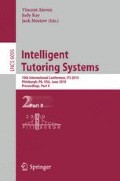Abstract
Successful individuals appear to have developed efficient method for reducing and coping with stress and anxiety. There is some evidence that emotions of this kind are correlated negatively with performance. Furthermore, it is important that new Intelligent Tutoring Systems (ITS) involve emotional coping strategies in order to improve the learner’s performance. In this paper, we show that problem-focused coping strategies are more efficient than emotion-focused ones for inducing positive emotions.
Access this chapter
Tax calculation will be finalised at checkout
Purchases are for personal use only
References
Blair, K.A., Denham, S.A., Kochanoff, A., Whipple, B.: Playing it cool: Temperament, emotion regulation and social behavior in preschoolers. Journal of School Psychology 42, 419–443 (2004)
Chaffar, S., Derbali, L., Frasson, C.: Towards Emotional Regulation in Intelligent Tutoring Systems. In: AACE World Conference on E-learning in Corporate, Government, Healthcare, & Higher Education: E-LEARN 2009, Vancouver, Canada (2009)
Gross, J.J.: The Emerging Field of Emotion Regulation: An Integrative Review. Review of General Psychology 2, 271–299 (1998)
Hazlett, R.L., Benedek, J.: Measuring emotional valence to understand the user’s experience of software. International Journal of Human-Computer Studies 65 (2007)
Klein, J., Moon, Y., Picard, R.W.: This computer responds to user frustration: theory, design, and results. Interacting with Computers 14, 119–140 (2002)
Perry, P., Hechter, F.J., Menec, V.H., Weinberg, L.H.: Enhancing achievement motivation and performance in college students: An attributional retraining perspective. Research in Higher Education 34, 687–723 (1993)
Reeves, B., Nass, C.: The media Equation: How people Treat Computers, Television, and New Media Like Real People and Places. Cambridge University Press, Cambridge (1996)
Author information
Authors and Affiliations
Editor information
Editors and Affiliations
Rights and permissions
Copyright information
© 2010 Springer-Verlag Berlin Heidelberg
About this paper
Cite this paper
Chaffar, S., Frasson, C. (2010). Using Emotional Coping Strategies in Intelligent Tutoring Systems. In: Aleven, V., Kay, J., Mostow, J. (eds) Intelligent Tutoring Systems. ITS 2010. Lecture Notes in Computer Science, vol 6095. Springer, Berlin, Heidelberg. https://doi.org/10.1007/978-3-642-13437-1_46
Download citation
DOI: https://doi.org/10.1007/978-3-642-13437-1_46
Publisher Name: Springer, Berlin, Heidelberg
Print ISBN: 978-3-642-13436-4
Online ISBN: 978-3-642-13437-1
eBook Packages: Computer ScienceComputer Science (R0)

